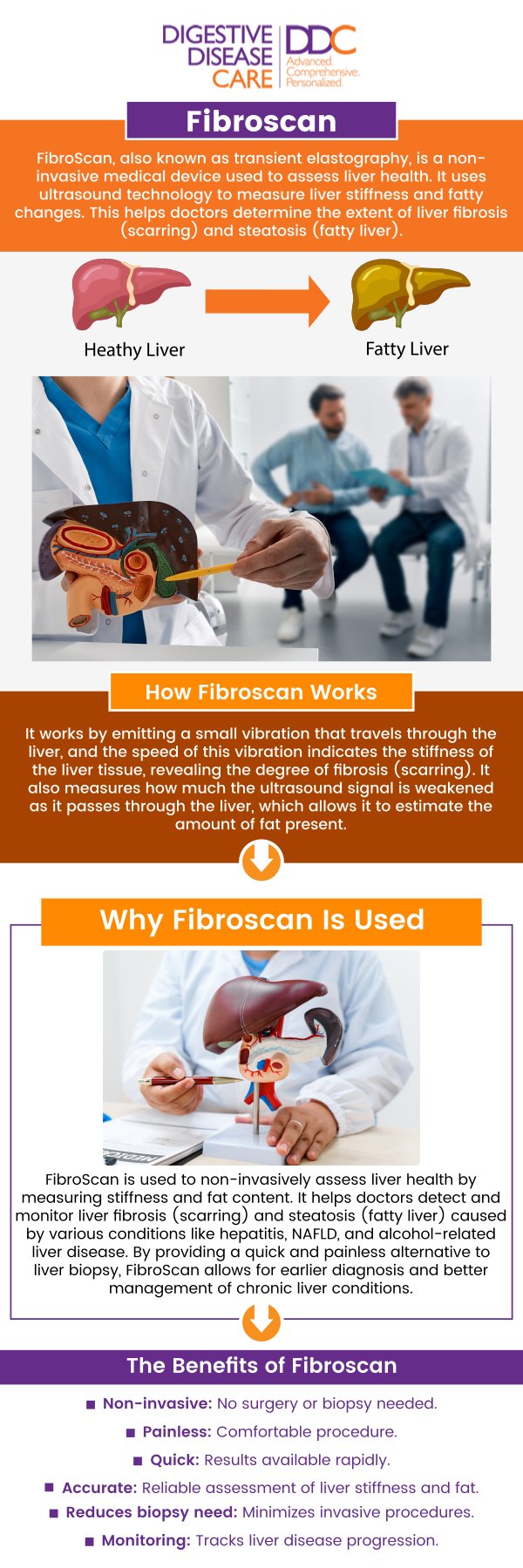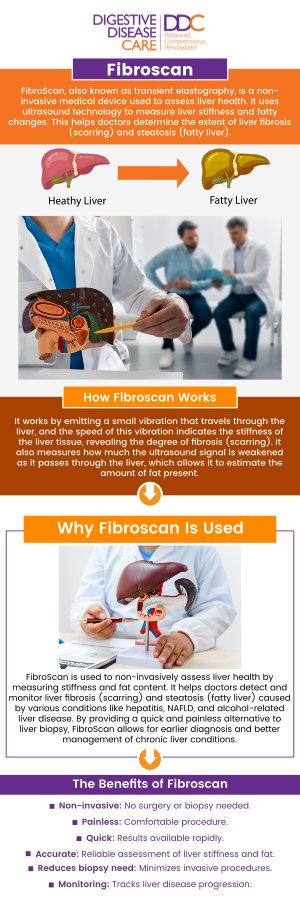Liver Fibrosis Treatment Specialist Q&A
Liver fibrosis is the buildup of scar tissue in the liver caused by repeated or long-term injury. It often develops silently, without noticeable symptoms in the early stages. At Digestive Disease Care, our board-certified gastroenterologists provide diagnosis and management to help prevent progression to cirrhosis. For more information, contact us today or schedule an appointment online. We have convenient locations to serve you in Babylon NY, East Setauket NY, Forest Hills NY, Jericho NY, Lake Success NY, Melville NY, Mineola NY, Massapequa NY, New Hyde Park NY, and Riverhead NY.


Table of Contents:
What is liver fibrosis?
What causes liver fibrosis?
What are the signs of advanced liver fibrosis?
How is liver fibrosis diagnosed?
Liver fibrosis is a medical condition that occurs when the liver becomes scarred due to repeated or long-term injury. The liver normally repairs itself after damage, but when this damage happens continuously, scar tissue begins to replace healthy liver cells. Over time, this buildup of scar tissue disrupts the normal structure and function of the liver, making it harder for the organ to work properly.
Fibrosis itself is not a disease but rather a process that can result from many conditions. Common causes include chronic viral hepatitis (such as hepatitis B or C), long-term alcohol use, nonalcoholic fatty liver disease, certain autoimmune disorders, and long-term exposure to toxins or medications. In the early stages, liver fibrosis may not cause noticeable symptoms, which makes it difficult to detect without medical testing.
If left untreated, fibrosis can progress to more severe stages, such as cirrhosis, which is advanced scarring that significantly impairs liver function. Cirrhosis can lead to complications like liver failure, portal hypertension, and even liver cancer. Early diagnosis and management of underlying causes are important to prevent progression. Lifestyle changes, avoiding alcohol, and treating the root condition can help slow or sometimes reverse liver fibrosis.
Liver fibrosis develops when the liver experiences ongoing injury or inflammation, leading to excessive scar tissue formation. This process is gradual and can be triggered by several underlying conditions. Understanding the main causes helps in identifying risk factors and managing the condition early.
Key causes of liver fibrosis include:
• Chronic viral infections such as hepatitis B and hepatitis C
• Long-term alcohol use or alcohol-related liver disease
• Nonalcoholic fatty liver disease (NAFLD) and nonalcoholic steatohepatitis (NASH)
• Autoimmune hepatitis, where the body’s immune system attacks liver cells
• Genetic disorders like Wilson’s disease or hemochromatosis
• Long-term exposure to toxins, certain medications, or industrial chemicals
• Metabolic conditions such as obesity, diabetes, and high cholesterol
• Persistent bile duct diseases like primary biliary cholangitis or primary sclerosing cholangitis
While liver fibrosis may not show symptoms in its early stages, addressing the underlying cause is key to preventing progression. Timely diagnosis, lifestyle modifications, and medical care can slow or even reverse damage. Early attention to liver health can reduce the risk of fibrosis advancing to cirrhosis or liver failure.
Advanced liver fibrosis often develops silently, with little to no symptoms in its early stages. As the scarring becomes more severe and liver function declines, noticeable signs and complications can appear. These symptoms indicate that the liver is struggling to carry out its normal processes, such as detoxification, protein production, and blood flow regulation.
Common signs of advanced liver fibrosis include:
• Persistent fatigue and weakness
• Loss of appetite and unintended weight loss
• Abdominal swelling (ascites) due to fluid buildup
• Swelling in the legs and ankles (edema)
• Easy bruising or bleeding from reduced clotting ability
• Yellowing of the skin and eyes (jaundice)
• Confusion, memory issues, or difficulty concentrating (hepatic encephalopathy)
• Enlarged spleen or veins visible on the abdomen
• Dark urine and pale-colored stools
• Nausea, vomiting, and general digestive discomfort
Recognizing these symptoms is important, as advanced fibrosis can progress to cirrhosis or liver failure if left untreated. Anyone experiencing these signs should seek medical evaluation promptly. Early intervention and treatment of the underlying cause may help slow progression and preserve liver health.
Liver fibrosis is often difficult to detect in its early stages because symptoms are usually absent or mild. For this reason, diagnosis relies on a combination of medical history, physical examination, and specialized tests that help assess liver structure and function. Detecting fibrosis early is important to prevent progression to cirrhosis or liver failure.
Methods used to diagnose liver fibrosis include:
• Reviewing medical history and risk factors such as alcohol use, hepatitis, or metabolic conditions
• Conducting blood tests to check liver enzymes, proteins, and markers of liver injury
• Using imaging tests like ultrasound, CT scan, or MRI to look for structural changes in the liver
• Performing transient elastography (FibroScan), a non-invasive test that measures liver stiffness
• Applying specialized blood-based fibrosis scoring systems (such as FIB-4 or APRI) to estimate severity
• In some cases, performing a liver biopsy, where a small tissue sample is examined under a microscope for scarring
A proper diagnosis of liver fibrosis usually involves combining test results with clinical evaluation. Early identification allows patients to address the root cause and follow a management plan to slow or reverse the progression of liver damage. For more information, contact us today or schedule an appointment online. We have convenient locations to serve you in Babylon NY, East Setauket NY, Forest Hills NY, Jericho NY, Lake Success NY, Melville NY, Mineola NY, Massapequa NY, New Hyde Park NY, and Riverhead NY and surrounding areas.

Check Out Our 5 Star Reviews


Additional Services You May Like

Additional Services You May Like
- Abdominal Pain
- Acid Reflux
- Barretts Esophagus
- Bloating
- Capsule Endoscopy
- Celiac Disease
- Colon Cancer Screening
- Colonoscopy
- Constipation
- Crohns Disease
- Diarrhea
- Diverticulitis
- Esophageal PH Monitoring
- Fatty Liver
- Fibroscan
- Gallstones
- Gastroenterologist
- Gastric Chest Pain
- Gluten Intolerance
- Hemorrhoid
- Hemorrhoid Banding
- Hepatitis
- Irritable Bowel Syndrome
- Lactose Intolerance
- Pancreatitis
- Polyps
- Rectal Bleeding
- Stomach
- Ulcerative Colitis
- GI Urgent Care





